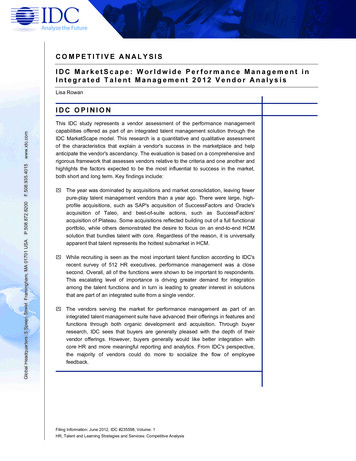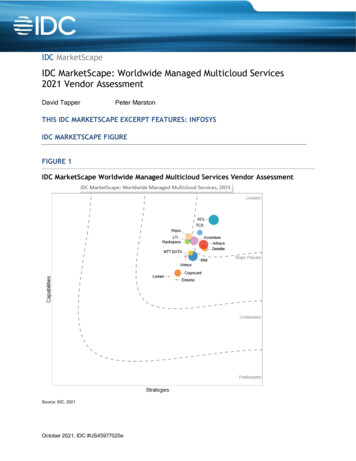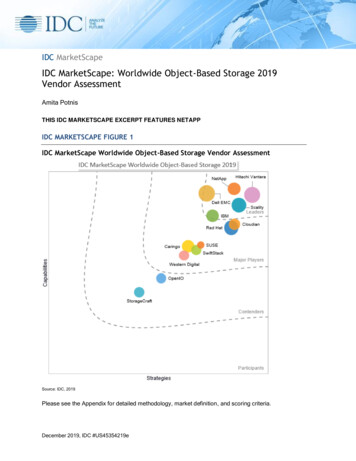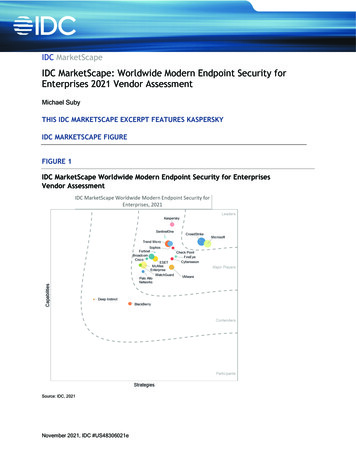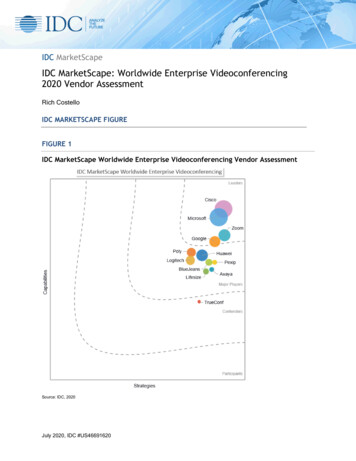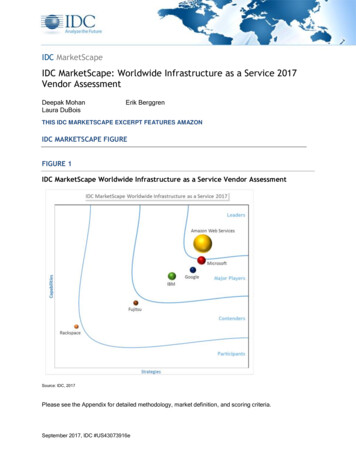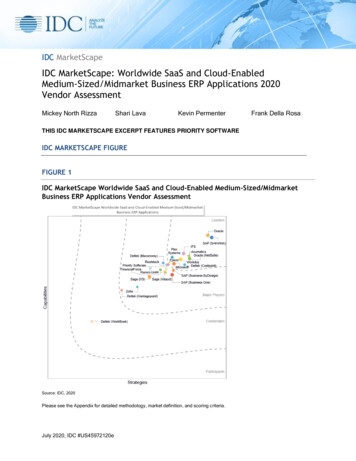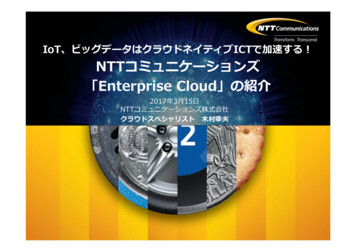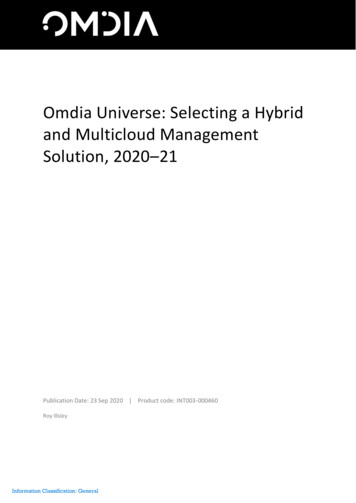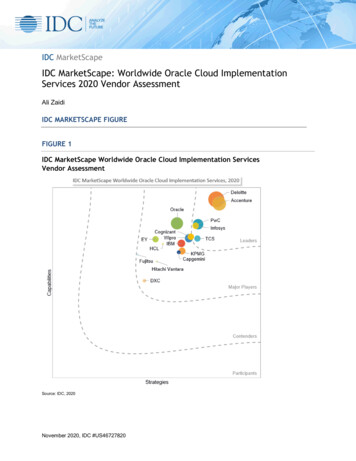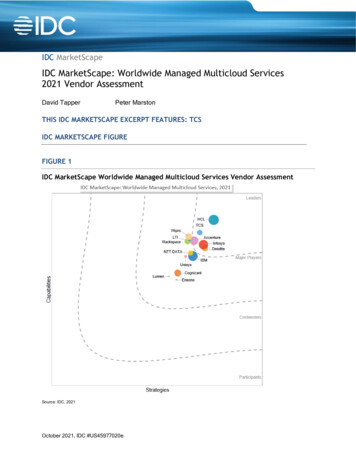
Transcription
IDC MarketScapeIDC MarketScape: Worldwide Managed Multicloud Services2021 Vendor AssessmentDavid TapperPeter MarstonTHIS IDC MARKETSCAPE EXCERPT FEATURES: TCSIDC MARKETSCAPE FIGUREFIGURE 1IDC MarketScape Worldwide Managed Multicloud Services Vendor AssessmentSource: IDC, 2021October 2021, IDC #US45977020e
Please see the Appendix for detailed methodology, market definition, and scoring criteria.IN THIS EXCERPTThe content for this excerpt was taken directly from IDC MarketScape: Worldwide Managed MulticloudServices 2021 Vendor Assessment (Doc #US45977020e). All or parts of the following sections areincluded in this excerpt: IDC Opinion, IDC MarketScape Vendor Inclusion Criteria, Essential Guidance,Vendor Summary Profile, Appendix and Learn More. Also included is Figure 1.IDC OPINIONUsing the IDC MarketScape model, IDC compared 14 service providers (SPs) that provide managedmulticloud services (MMS). IDC research highlights that when it comes to utilizing managed multicloudservices, enterprises are seeking to use these services to become more agile, drive revenue, andstandardize the IT environment. However, as firms expand their use of cloud, they are confronting thecomplexity of managing across a vast set of IT resources spanning cloud operating models (private,public, hybrid), cloud platforms (infrastructure as a service [IaaS], platform as a service [PaaS],software as a service [SaaS]), and cloud service providers (e.g., AWS, Azure, Google, IBM,ServiceNow, Alibaba, Oracle, SAP, salesforce.com, Workday). Complicating the management of allthese resources is knowing how to optimize where to place workloads and application types (e.g.,ERP, SCM, CRM), critical software brands (SAP, Oracle, Microsoft), and competencies (e.g.,analytics, blockchain, cognitive/artificial intelligence [AI], hybrid cloud, IoT), to name a few. This iswhere managed SPs can help enterprises orchestrate and manage across a constantly expanding andshifting landscape of assets, providers, processes, and people to support client multicloud needs.IDC used more than 100 criteria and 27 in-depth customer interviews spanning 10 countries and 11industries to compare managed SPs that provide managed multicloud services, for which there are anarray of players competing in this market. IDC's findings revealed that while each of these managedSPs exhibited many similarities in their capabilities supporting a broad portfolio of managed multicloudservices, players do differentiate and are differentiated by key factors involving applications andinfrastructure; financial variables and measurements; platforms spanning IaaS, PaaS, and SaaS;innovative technologies and capabilities; operational management; and ecosystem of partners. IDC'sfindings also highlight client feedback that reflects client experience in utilizing managed SPs formanaged multicloud services to execute these capabilities. If your organization is focused on usingmanaged multicloud services, leverage this IDC MarketScape as a companion tool to compare andcontrast providers your organization is considering or shortlisting to support your use of these services.IDC MARKETSCAPE VENDOR INCLUSION CRITERIAIDC collected and analyzed data on 14 service providers within its 2021 IDC MarketScape formanaged multicloud services assessment. Vendor options for managed multicloud services areextensive and cover a broad set of different types of players. In determining the group of vendors foranalysis in this IDC MarketScape, IDC utilized the following set of inclusion criteria: Revenue. Minimum of 100 million worldwide generated by managed multicloud services Delivery locations. Geographic presence (i.e., feet on the ground, delivery capability acrossmajor regions) in a minimum of two regions (e.g., Americas, EMEA, APAC) 2021 IDC#US45977020e2
Managed multicloud services coverage. Must support either or both of the following for clients:two or more public cloud providers and/or hybrid clouds used by a client (combining privateand public) Technology coverage. Applications (e.g., ERP, productivity, SCM, CRM) for cloud andnoncloud technologies and/or cloud infrastructure (e.g., compute, storage, network) Number of public cloud partners (IaaS, PaaS, and SaaS providers). Minimum of two publiccloud providers spanning IaaS, PaaS, and SaaS Life cycle of services (end-to-end services). From modernizing (e.g., architecting,developing/migrating) to ongoing managementADVICE FOR TECHNOLOGY BUYERSThe combination of COVID-19, climate change, shifting societal norms, and buyer behavior hasdramatically elevated the business and IT requirements that firms needs to meet in order to maintaincompetitiveness. These requirements involve factors such as faster time to market, meeting newcompliance and regulations, personalizing goods and services, creating sustainable operations andproducts, as well as adapting much more quickly to rapid changes. The impact of these pressures isthat firms need to make a fundamental shift in the underlying IT resources and assets by creating acloud centric set of capabilities. However, as firms expand the use of cloud resources, they are facingan increasingly daunting task of ensuring that they not just can maintain control but also canorchestrate the development, deployment, and management of these resources effectively.Consequently, many managed SPs are positioning themselves as having the right balance ofresources and capabilities to help firms meet these challenges. Though enterprises expect managedSPs to have a broad set of capabilities, through detailed client interviews and extensive demand-sideresearch, IDC has identified the following critical areas that buyer organizations should consider intheir process of selecting the optimal vendor to meet their needs for managed multicloud services: Ensure access to the right talent. The breadth of talent and skill to support a multicloudenvironment is both constantly expanding and changing. The types of talent span fromtechnical expertise involving a wide array existing and new technologies (hardware andsoftware) and delivery platforms (IaaS, PaaS, SaaS) to talent needed to support newprocesses (DevOps, continuous integration/continuous delivery [CI/CD], site reliabilityengineering [SRE]), use of new types of service providers (e.g., AWS, Azure, Google, Alibaba,ServiceNow, salesforce.com, Workday), and implement operational excellence that includesthe use of advanced automation (cognitive/AI) in orchestrating across all these resources.When it comes to buyers of managed multicloud services, they expect that managed SPs beable to provide them with the right resource at the right time in the right location with highlyskilled talent across any of the aforementioned areas. In addition, firms expect that a managedSP be able to find resources outside its organization, such as with partners or potentiallycrowdsourcing, to fill any gaps that the managed SP might have. Further, enterprises areincreasingly expecting that the managed SP helps train the client's employees on how toutilize these new types of cloud capabilities. Essentially, enterprises are looking for a managedSP that creates a team environment in which the client is part of the team and can learn withthe managed SP. Understand approach to multicloud management (MCM). Enterprises are learning through theimplementation of cloud capabilities (private, public, hybrid) and the use of cloud serviceproviders that becoming fluent in utilizing cloud resources requires a new approach to IT andnew sets of tools and technologies. Four key areas in which managed SPs need to invest to 2021 IDC#US45977020e3
create this new approach to managing IT using cloud capabilities first involves taking a longterm approach to making critical investments at the beginning of an engagement to avoidpotentially costly mistakes down the road. While this may seem counterintuitive in a world thatmoves faster, better strategic planning will likely yield creating the standards, frameworks, andblueprints that will both minimize or eliminate defects in a process or technology solution andhelp streamline operations. The second area on which managed SPs should focus insupporting multicloud management involves embedding processes that can enable continuousand rapid change (e.g., DevOps, CI/CD, SRE), which ultimately requires both creation ofstandards and integration of the life cycle of services from architecting and developing todeploying and managing cloud resources. The third key factor involves the need for managedSPs to support any cloud technology solution and resource that increasingly involves anexpanding universe of cloud service providers across IaaS, PaaS, and SaaS. Finally,enterprises are looking for managed SPs to implement robust governance for meetingcompliance, costs, quality of service, and utilization of resources with the aid of a managedmulticloud set of tools and platforms (e.g., single pane of glass). Assure collaboration and communication are core to the relationship. While COVID-19 hasforced both enterprises and service providers to adapt to new ways of working with oneanother, clients indicate that key to a successful engagement with managed SPs in usingmanaged multicloud services is having a robust means of collaborating and communicating.Key elements of an effective relationship require that the managed SP is proactive, providesdetails including quick feedback, is vigilant to ensure that all gaps are covered, enablescontinuous learning, and ensures that there is constant communication. Clients also highlightthe need for workshops where ideas can be flushed out and for ensuring joint definition ofobjectives. Finally, ensuring that the collaborative process is streamlined, both stakeholders,customers and managed SPs, need to manage expectations. Establish rules of partnership. Ultimately, clients are looking for a managed SP to be a partnerbut not the "over the wall" partner. Firms expect that managed SPs treat the client as apartner, which requires having open and transparent relationships, difficult conversations, andthe ability to keep and attract talent. Further, clients are looking for a partnership that isfocused on being a "business" partner, not just a partner that can operate cloud environments.To this issue of being a business partner, it will require managed SPs to invest in talent thathas the process knowledge and skills required to work in the world of line-of-business (LOB)executives. As more of cloud becomes automated, more emphasis will need to be placed onthe business side of a firm's operations. Essentially, this will require much more "street talk"and much less tech talk.VENDOR SUMMARY PROFILESIDC evaluated 14 service providers against more than 100 criteria as part of its 2021 IDC MarketScapefor worldwide managed multicloud services analysis. IDC also interviewed 27 buyer organizations tolearn more about how the organizations were able to navigate cultural change and generate businessresults from using managed multicloud services. Companies that IDC interviewed came from a widerange of industries including computer, education, energy, financial services, government, healthcare,manufacturing, retail, telecommunications, and transportation. IDC interviewed managed cloudservices buyers that are located in Australia, Bahrain, Brazil, Finland, India, Ireland, Japan,Netherlands, the United Kingdom, and the United States. This section briefly explains IDC's keyobservations resulting in a vendor's position in the IDC MarketScape. While every vendor is evaluatedagainst each of the criteria outlined in the Appendix, the description here provides a summary of eachvendor's strengths and challenges. 2021 IDC#US45977020e4
TCSTCS is positioned in the Leaders category in the 2021 IDC MarketScape for worldwide managedmulticloud services.TCS' strategy for cloud is anchored to TCS Business 4.0, which is focused on helping clients transformtheir businesses to a borderless enterprise. To support enterprises along the journey to the cloud, TCSprovides an end-to-end set of cloud capabilities with its consulting-led approach. This starts with itsCloud Strategy & Transformation strategic offering that includes providing a strategy and vision,multicloud advisory, data and analytics advisory, and a cloud transformation office for which TCS cansupport migration and modernization across all technology environments (e.g., mainframe, ERP,containers). TCS also supports next-generation technologies (e.g., IoT, blockchain, AR/VR) as well asbusiness solutions including industry clouds. Finally, TCS offers clients a full suite of operationalcapabilities supported by TCS Cloud Exponence, which is TCS' multicloud management platform.TCS utilizes an extensive ecosystem of alliances and partners to support its managed multicloudservices business for which it has created dedicated business units for AWS, Google, and MicrosoftAzure. Across these three business units, TCS now has more than 30,000 certified and trainedprofessionals. TCS also has built an extensive set of partnerships with cloud vendors (e.g.,ServiceNow, Nutanix, Cloudscape) and technology vendors (e.g., VMware, NetApp), which, along withTCS' COIN (Co-Innovation Network) partnerships, it utilizes to support cloud requirements.In addition, TCS has built its own proprietary TCS Enterprise Cloud, which provides full-stack servicesfrom cloud strategy, implementation, migration, and modernization to cloud operations for workloads.As a key differentiator of TCS' cloud capabilities, the TCS Enterprise Cloud has 21 TCS CloudAvailability Zones located in the United States, the United Kingdom, Germany, Sweden Finland,Japan, Australia, Singapore, and India; is supported by more than 3,500 experienced practitioners;utilizes a broad array of partnership (e.g., IBM, SAP, Google, AWS, Azure); and incorporates extensiveautomation via ignio, which is TCS' autonomous AIOps software platform that combines context,insights, and intelligent automation to resolve and prevent issues in IT and business operations. TheTCS Enterprise Cloud looks to provide clients with the ability to innovate and achieve operationalexcellence for the cloud resources required to support their businesses.StrengthsTCS exceeded industry standards for upgrading legacy infrastructure to private cloud IaaSinfrastructure as part of managed multicloud services as well as for supporting legacy custom-codedapplications (e.g., COBOL) and any type of Microsoft, SAP, and Oracle applications (e.g.,legacy/noncloud application architectures, applications architected for the cloud including SaaS). TCSalso exceeded industry standards in the usage of Docker technologies for containers, Alibaba forPaaS, Microsoft for SaaS, and innovative capabilities including analytics technologies, IoT, andserverless computing/function as a service on public clouds (spanning IaaS, PaaS, and/or SaaS) aspart of managed multicloud services. Further, TCS had a higher percentage of engagements usingmanaged multicloud services for edge computing from public cloud providers (e.g., AWS Outpost,Azure Stack, Google Anthos) than what was observed in the industry. Finally, TCS' total centers ofexcellence/labs (physical locations) to support managed multicloud services exceeded the marketaverage.Operationally, TCS provided clients with lower RTO for managed multicloud services than the marketstandard while incorporating multicloud management platform capabilities (e.g., management 2021 IDC#US45977020e5
platforms, tools, technologies) at a higher utilization rate of client engagements than what wasobserved in the industry. TCS' footprint of physical security operations centers (SOCs) also exceededthe market standard. Finally, clients rated TCS highly for client feedback effectiveness.On the financial side, the rate of usage of payment for just capacity used (e.g., gigabytes of compute,storage), fixed fee payment (fixed amount of money) for a given period of time (e.g., one month, oneyear, three years), and payments based on business outcomes (e.g., number of transactionprocesses, achieving a target cost savings) all exceed market standards. TCS also showcased ahigher rate of business generated from working with partners (e.g., public cloud providers, technologyvendors) and a higher average "premium/uplift" involving clients using managed multicloud servicesfor systems software technologies (e.g., VMs, containers) hosted on public IaaS clouds as comparedwith market averages.ChallengesTo grow its opportunities in the market for managed multicloud services, TCS should look to invest instrategic areas including migrating existing applications (e.g., custom coded, packaged applications)for use on private and/or public cloud infrastructures (IaaS) and incorporating the use of both publicIaaS and public PaaS as part of managed multicloud services, where it trailed industry averages.On the operational side, TCS was below the market average for the number of completed cloudengagements it uses to automate capabilities (e.g., architecting, developing, provisioning) inmulticloud management platforms. In addition, TCS' largest engagement involving containers formanaged multicloud services based on number of CPU cores lagged the market standard.When it came to client feedback, customers found issues in getting access to cloud providers. Inaddition, in a 2020 IDC worldwide demand-side survey of enterprises regarding managed cloudservices across six countries, buyers indicated TCS trailing the market group average when it comesto respondents indicating their preference to switch to a different managed service provider whenprocuring managed services for cloud (see Managed CloudView 2020: Executive Summary, IDC#US46875120, September 2020).APPENDIXReading an IDC MarketScape GraphFor the purposes of this analysis, IDC divided potential key measures for success into two primarycategories: capabilities and strategies.Positioning on the y-axis reflects the vendor's current capabilities and menu of services and how wellaligned the vendor is to customer needs. The capabilities category focuses on the capabilities of thecompany and its services today, here and now. Under this category, IDC analysts look at how well avendor is building/delivering capabilities that enable it to execute its chosen strategy in the market.Positioning on the x-axis, or strategies axis, indicates how well the vendor's future strategy aligns withwhat customers will require in three to five years. The strategies category focuses on high-leveldecisions and underlying assumptions about offerings, customer segments, and business and go-tomarket plans for the next three to five years. 2021 IDC#US45977020e6
The size of the individual vendor markers in the IDC MarketScape represents the market share of eachindividual vendor within the specific market segment being assessed.IDC MarketScape MethodologyIDC MarketScape criteria selection, weightings, and vendor scores represent well-researched IDCjudgment about the market and specific vendors. IDC analysts tailor the range of standardcharacteristics by which vendors are measured through structured discussions, surveys, andinterviews with market leaders, participants, and end users. Market weightings are based on userinterviews, buyer surveys, and the input of IDC experts in each market. IDC analysts base individualvendor scores, and ultimately vendor positions on the IDC MarketScape, on detailed surveys andinterviews with the vendors, publicly available information, and end-user experiences in an effort toprovide an accurate and consistent assessment of each vendor's characteristics, behavior, andcapability.Completing this IDC MarketScape involved participants completing seven distinct steps. During thefinal step, Cognizant was not able to provide feedback for its final results.Scoring ProcessIDC follows a rigorous process in developing vendor ratings and weightings that involved utilizingIDC's full range of scoring options (1–5). To determine scores, IDC utilized the empirical informationthat vendors provided via a comprehensive RFI from which IDC rated more than 100 scoring elementsacross the scope of a vendor's business for managed multicloud services as well as feedback fromclient interviews. The types of information provided for these scoring elements involved the degree ofmaturity in adoption of a vendor's capabilities by their clients along with degree of vendor investmentsand financial results as well as client feedback. IDC rated scoring elements with quantitativeinformation across both strategies and capabilities categories using a one-step approach. Scoringelements from the strategies segment involving qualitative insights utilized a multistep approach thatinvolved identifying a common set of variables across participants to ensure an objective assessmentand then aligning these with the appropriate quantified scoring elements by which to create an overallrating. In assessing client feedback via interviews with vendor customers, IDC utilized a series of clientrankings of vendors to determine IDC ratings.Scoring Criteria and DefinitionsWhile IDC's Worldwide Managed Cloud Services Survey, conducted in both 3Q20 and 3Q21 andinvolving 1,500 respondents across six countries and three regions, helped shape many of the scoringcriteria and definitions in the 2021 IDC MarketScape for worldwide managed multicloud services, IDCutilized an array of other IDC buyer studies on managed cloud services. These buyer studies probedbuyers on maturity levels, interests, and preferences for managed cloud services, which included useof multiclouds. IDC utilized all this data in addition to buyer interviews to establish the right scoringelements reviewed in the evaluation.WeightingsCriteria weightings used in this IDC MarketScape were sourced and derived using IDC survey data,IDC forecasts, vendor market shares, and customer interviews. Customer interviews helped revealmultiple criteria that buyer organizations cited as critical in their service provider selection andretention processes. IDC distilled and consolidated the criteria customers shared into several majorcategories and weighted criteria based on volume of responses within the categories across the IDC 2021 IDC#US45977020e7
MarketScape model. IDC also utilized survey data based on 1,500 respondents across six countries toassign weightings across the criteria used in assessing vendors.Service Provider Customer InterviewsAs part of this IDC MarketScape, IDC conducted interviews with vendor-provided client references.IDC utilized these customer interviews to learn about six areas: the customers' project backgrounds,how customers approached the service provider selection process and what critical criteria they usedto select their vendor, what sort of results customers were able to generate from managed multicloudservices, next steps for their managed cloud services evolution, key lessons learned, and whatcustomers felt were the differentiating and key strengths that their chosen managed SP possessed.The results of these interviews contributed to the ratings and weighting scales used in assessing thevendors participating in this analysis.The IDC MarketScape for managed multicloud services assessment is designed to evaluate thecharacteristics of each vendor and each vendor's global presence, measured by vendor revenue andscope of capabilities. Many managed SPs compete in various aspects of managed multicloudservices. As such, this evaluation is not an exhaustive list of all the players to consider for managedmulticloud services. Instead, this evaluation reviews the primary players that offer capabilitiesspanning the life cycle of services across designing, building, and managing cloud environments forthe full stack of IT from infrastructure to applications and across the full array of cloud types (e.g.,public, private, hybrid) and across different cloud platforms (e.g., IaaS, PaaS, SaaS, containers). Clientfactors like business and information technology (IT) objectives and requirements along with culture ofboth vendor and client organizations play integral roles in determining which vendors should beconsidered as potential candidates for a managed multicloud services engagement.Market DefinitionManaged Multicloud ServicesManaged multicloud services (MMS) is a subset of managed cloud services (MCS). Essentially,managed cloud services provide a holistic view of managing all types of cloud environments ashighlighted in Figure 2. This IDC MarketScape excludes supporting customers in which managed SPsare managing just a "single" cloud (just private or just public) for a client (see IDC's WorldwideManaged Cloud Services Taxonomy, 2020, IDC #US46987120, November 2020). 2021 IDC#US45977020e8
FIGURE 2Managed Cloud Services Family of Primary and Secondary MarketsSource: IDC, 2021The focus of this 2021 IDC MarketScape for worldwide managed multicloud services is on managedSPs that support managing multiple clouds that can include the following: Hybrid cloud: This involves the managed SP managing (on behalf of a client) a combination ofan enterprise's private cloud needs (which could include one or more private clouds) alongwith one or more public clouds across IaaS, PaaS, and/or SaaS, which could involve one ormore public cloud providers. Multiple public clouds: This involves the managed SP managing (on behalf of a client) multiplepublic cloud environments across IaaS, PaaS, and/or SaaS involving the use of two or more(multiple) and "different" public cloud providers.The following are some additional factors that IDC included as part of its definition on managedmulticloud services: Perspective from a customer view, not a contract view: IDC views managed multicloudservices from a customer/client perspective. Meaning that while a client might sign individualcontracts for each cloud that the managed SP manages for the client, IDC is interested in howmany clouds the managed SP manages for a client, even if there are multiple contractsinvolved. Life cycle of services: This IDC MarketScape included "embedded" professional services (e.g.,business consulting, technology consulting, migration, application development) to support"migration (modernization) to the cloud," which are standard capabilities included as part ofany managed service. 2021 IDC#US45977020e9
Role of multicloud platforms and technologies: In terms of the use of multicloud platforms andtechnologies, IDC views this as an "input" to supporting delivery of cloud capabilities tosupport multiple clouds. This study did not require that customers use a multicloudmanagement platform from the managed SP, just that the managed SP provisions managedcloud services to support multiple public clouds and/or hybrid clouds that clients use to supporttheir businesses. However, IDC included assessment criteria regarding the use of multicloudmanagement platforms and technologies as part of supporting the provisioning of managedmulticloud services.Exceptions and ExclusionsWhile managed cloud services involve the full life cycle of services that include "embedded"professional services, such as strategy, assessment, migration, modernization, and implementationservices, for professional services that are procured as a set of discrete capabilities not included aspart of the managed services engagement, IDC excludes these "discrete" engagements.IDC also excluded client use of managed cloud services to support the following types of single cloudenvironments: Single private cloud: This involves the managed SP supporting clients in managing theirenterprise private cloud needs. This can encompass a single private cloud or support formultiple private clouds that are utilized by a single client. Private clouds can also be locatedanywhere (e.g., on premises, hosted/colocation). Single public cloud: This involves the managed SP supporting clients in using a single publiccloud provider. This can encompass managed SPs supporting clients using a single cloudservice (e.g., IaaS) or multiple cloud services from a single public cloud provider (e.g., usingMicrosoft Azure for both IaaS and Microsoft Dynamics).LEARN MORERelated Research Worldwide Managed Cloud Services Deal Penetration for the IT Outsourcing Services Market,2016–2020 (IDC #US47083521, September 2021)Market Analysis Perspective: Worldwide Managed Cloud Services, 2021 (IDC #US47084321,August 2021) Managed Cloud Services: The Role of Edge Computing (IDC #US47674121, May 2021) Managed Cloud Services: Optimizing a Cloud Ecosystem Matrix (IDC #US47083321, May2021) Managed Cloud Services: The Value of Multicloud Management (IDC #US47424321,February 2021) Air Traffic Control: The Managed SP Role in a Changing Service Provider Industry (IDC#US44650419, February 2021) Managed Service Providers and Cloud Service Providers: The Changing Dynamics ofCollaborating, Competing, and Controlling (IDC #US45926420, November 2020) Managed CloudView 2020: Executive Summary (IDC #US46875120, September 2020) 2021 IDC#US45977020e10
SynopsisThis IDC study represents a vendor assessment of providers offering managed multicloud servicesthrough the IDC MarketScape model. The assessment reviews both quantitative and qualitativecharacteristics that define current market demands and expected buyer needs for managed multicloudservices. The evaluation is based on a comprehensive and rigorous framework that assesses howeach vendor stacks up, and the framework highlights the key factors that are expected to be the mostsignificant for achieving success in the managed multicloud services market over the short term andthe long term."Buyers need to manage a complex set of IT and cloud resources that involves different cloudoperating models (private, public, hybrid), cloud platforms (IaaS, PaaS, SaaS), and cloud serviceproviders is creating increased co
Vendor options for managed multicloud services are extensive and cover a broad set of different types of players. In determining the group of vendors for analysis in this IDC MarketScape, IDC utilized the following set of inclusion criteria: Revenue. Minimum of 100 million worldwide generated by managed multicloud services
